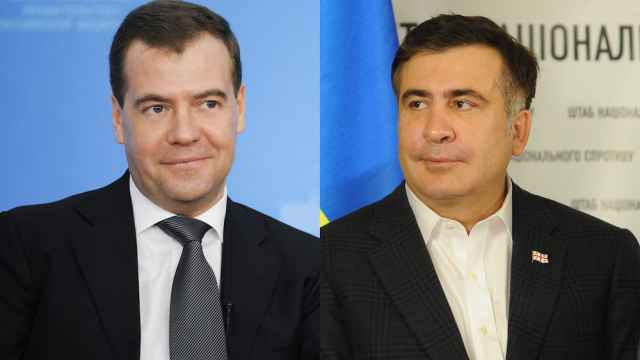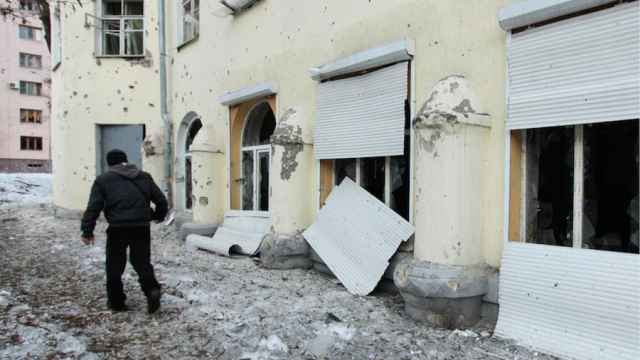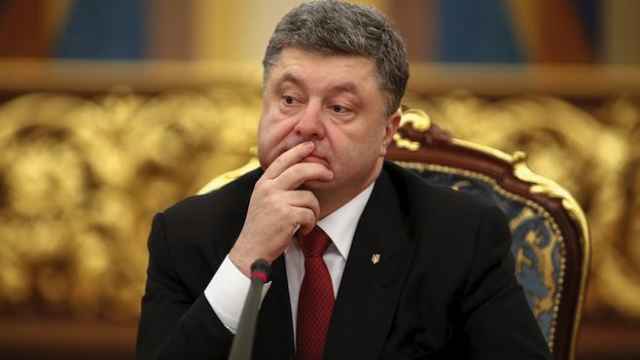If their track record for blocking thousands of websites wasn’t already well documented, it would be easy to believe Russian officials sincerely cared about Internet freedom.
“It is stupid and irrational, to operate with bans and prohibitions on the Internet,” Yevgeni Revenko, a pro-Kremlin lawmaker, said May 16. “People will find ways around it.”
Bans on the Internet bring out “legal nihilism” in people, by forcing them to look for murky shortcuts, Alexei Volin, deputy minister of communications, noted the same day. Violating people’s right to information is bad for a country’s population, Kremlin spokesman Dmitry Peskov added.
On May 16, the European Court of Human Rights announced it lodged a complaint with Russia for banning 5 million websites. But Russian officials were responding to another matter entirely: Ukrainian President Petro Poroshenko banning Russia’s biggest internet companies from operating in Ukraine.
Among the entities facing restrictions in Ukraine under the sanctions is the Mail.ru Group, a major Russian internet company that owns VKontakte and Odnoklassniki.
The order also requires Ukrainian internet providers to block all Yandex services, including its search engine, anti-virus companies Kaspersky Lab and DrWeb and the accounting software company 1C.
“It’s time we acted with more determination,” Ukrainian President Petro Poroshenko wrote on his pages on Russia’s biggest social networks Vkontakte and Odnoklassniki on May 16. “Hybrid warfare demands adequate responses to challenges.”
According to Mail.ru Group, 25 million Ukrainians use their services — more than half of the country’s population. Sixteen million use the Vkontakte social network. Some 10 million use Odnoklassniki, while Yandex attracts 11 million.
But the ban isn’t censorship, says Ukrainian political analyst Taras Berezovets. “It is not a secret that Odnoklassniki, Vkontakte and Mail.ru are being actively used for propaganda and counter-propaganda in the interest of Russia’s law enforcement,” Berezovets wrote on Facebook following the ban.
“The Security Council’s decision to ban — let’s call them what they are — Russia’s diversionary resources is not just right, but vital.”
There is a military aspect to the ban, says international affairs analyst Vladimir Frolov. When you’re at war, you do what it takes to stop the enemy from spreading propaganda on your territory.
“‘War is war,’ is Kiev’s logic,” Frolov told The Moscow Times, “Poroshenko uses it, playing on the side of patriots.”
Will Moscow retaliate? Frolov says Moscow doesn’t need escalation right now — it is trying to mend fences with the U.S. and show the world that Ukrainian government is not smart.
Moreover, Russia has little left of Ukraine to ban. Most pro-Ukrainian websites in Russia were banned in 2014. “There might be some new economic restrictions Russia could introduce, but it looks like it already restricted everything it could.”
Following the move, Yandex, Vkontakte and Mail.ru Group unanimously expressed their regret that Ukrainian authorities planned to strip millions of users of their services. The companies said they would suffer almost no damages.
“The Yandex group is large,” a company spokesperson told The Moscow Times in written comments. “The sanctions won’t affect it negatively.” The share of Ukrainian business is the Mail.ru Group’s revenue mix is insignificant, the company said in an online statement — the ban won’t affect the company’s financial or development plans.
Especially since the ban is unlikely to be implemented soon — the very mechanism of blocking websites is yet to be developed, says Sergei Petrenko, former head of Yandex.Ukraine. “It’s not something you can do quickly,” Petrenko told The Moscow Times.
In addition, it is easy to access blocked websites through proxy servers, VPNs and anonymizing software — Mail.ru even published a manual on how to do it. What may prove more problematic for Ukrainians is a ban on 1C accounting software — according to Evrosoftprom, a 1C distributor in Ukraine, some 300,000 companies use it.
“I have no idea what they’re going to do without it,” Alexander Fediyenko, head of the Ukraine’s Internet Association, told The Moscow Times. There are Ukrainian analogues of 1C, notes Petrenko. But they’re not as good.
The question when the ban will be implemented remains unanswered. Human Rights Watch called on Poroshenko to rescind the decree banning Russian websites citing freedom of speech related concerns. Yandex, Mail.ru, Vkontakte and Odnoklassniki were still fully functional in Ukraine as of Wednesday afternoon.
A Message from The Moscow Times:
Dear readers,
We are facing unprecedented challenges. Russia's Prosecutor General's Office has designated The Moscow Times as an "undesirable" organization, criminalizing our work and putting our staff at risk of prosecution. This follows our earlier unjust labeling as a "foreign agent."
These actions are direct attempts to silence independent journalism in Russia. The authorities claim our work "discredits the decisions of the Russian leadership." We see things differently: we strive to provide accurate, unbiased reporting on Russia.
We, the journalists of The Moscow Times, refuse to be silenced. But to continue our work, we need your help.
Your support, no matter how small, makes a world of difference. If you can, please support us monthly starting from just $2. It's quick to set up, and every contribution makes a significant impact.
By supporting The Moscow Times, you're defending open, independent journalism in the face of repression. Thank you for standing with us.
Remind me later.






